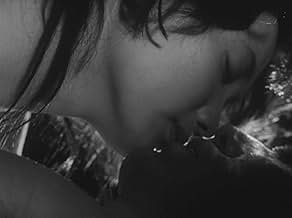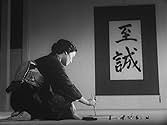NOTE IMDb
7,4/10
2,1 k
MA NOTE
Dramatisation Nô sur les suicides du lieutenant Shinji Takeyama et de son épouse Reiko. Après avoir participé à un coup d'État raté en 1936 et avoir reçu l'ordre d'exécuter ses amis, il fait... Tout lireDramatisation Nô sur les suicides du lieutenant Shinji Takeyama et de son épouse Reiko. Après avoir participé à un coup d'État raté en 1936 et avoir reçu l'ordre d'exécuter ses amis, il fait ses adieux intimes à sa femme et commet un harakiri.Dramatisation Nô sur les suicides du lieutenant Shinji Takeyama et de son épouse Reiko. Après avoir participé à un coup d'État raté en 1936 et avoir reçu l'ordre d'exécuter ses amis, il fait ses adieux intimes à sa femme et commet un harakiri.
- Réalisation
- Scénario
- Casting principal
Histoire
Le saviez-vous
- AnecdotesAfter Mishima's death on 25 November 1970, all prints of this film were rumored to have been destroyed by his wife Yoko. However, in August 2005, original film negatives were "discovered" at the late author's residence in Ota Ward, Tokyo. About 40 reels have now been found in what Japanese media refer to as an "airtight tea box". According to Hiroaki Fujii (78), the movie's producer (who at the time apparently urged Yoko to keep the original intact), the recovered elements are in "pristine condition". The film will be released on DVD by Shinchosha early in 2006.
- ConnexionsReferenced in Mishima - une vie en quatre chapitres (1985)
Commentaire à la une
Infrequently, the esteemed "Criterion Collection" DVD label puts out a Short Subject as a stand-alone release (as opposed to comprehensive collections, such as the recently-referenced Jean Painlevé one and another devoted to the works of Stan Brakhage), albeit reasonably priced – for them – at a much lower-than-usual tier. A couple of these were notable films worthy of such a pedigree – Alain Resnais' fascinating (if necessarily harrowing) depiction of concentration-camp atrocities NIGHT AND FOG (1955) and Albert Lamorisse's charming (and Oscar-winning) THE RED BALLOON (1956; actually issued as a dual-movie edition with the same director's WHITE MANE {1953}, which I own but have yet to check out).
This one, then, was an odd choice for such a distinction: not only is it not that well-known, even to more-than-casual film-buffs (I, for one, was completely unaware of it!) but, since it was a half-hour effort written, directed by and starring celebrated Japanese author Mishima, ideally it ought to have served as a great bonus feature on the same company's digital edition of Paul Schrader's semi-biopic MISHIMA: A LIFE IN FOUR CHAPTERS (1985; which, again, I do have a copy of but remains as-yet unwatched) – rather than ask potential buyers to fork out extra money for an additional disc! For the record, I had previously watched Kon Ichikawa's masterful rendition of Mishima's CONFLAGRATION (1958), as well as seen the author himself assume the lead role in Yasuzo Masumura's gangster thriller AFRAID TO DIE (1960); besides, I own other two adaptations of his work – THE MUSIC (1972), also by Masumura, and the Americanization of THE SAILOR WHO FELL FROM GRACE WITH THE SEA (1976).
Anyway, what we have here is a Silent movie (itself divided into 5 chapters) – the narrative's progression described exclusively via the text (included on the DVD in either the original Japanese with accompanying English subtitles, as I opted to acquire it myself, or a ready-made English translation) on a scroll held in front of the camera! – involving the aftermath of a failed coup d'etat. A military officer (Mishima) is asked to execute the men responsible but, as they are his friends and colleagues, he becomes conflicted by this grave assignment (hence, the title is ironic): his understanding wife knows what this entails – he shirks his duty by committing ritual suicide on the eve of the appointed task (but not before having spent the night with his spouse), to be followed by the woman herself (who subsequently has nothing to live for)!
The double "seppuku" is quite graphically handled, with a generous display of blood and entrails 'tarnishing' the otherwise impeccable and spare monochromatic setting! The plot may bear similarities to the legendary (and oft-filmed, including an ill-advised brand-new version) saga of "The 47 Ronin" but it had a chilling duplication in reality four years later when Mishima, himself a soldier with radical political beliefs, attempted an overthrow of authority and 'forced' (though some argue it was planned as such all along!) to take his own life when his 'noble' intentions left most of the witnessing 'brothers-in-arms' nonplussed and openly mocking! Talk of life imitating art!
This one, then, was an odd choice for such a distinction: not only is it not that well-known, even to more-than-casual film-buffs (I, for one, was completely unaware of it!) but, since it was a half-hour effort written, directed by and starring celebrated Japanese author Mishima, ideally it ought to have served as a great bonus feature on the same company's digital edition of Paul Schrader's semi-biopic MISHIMA: A LIFE IN FOUR CHAPTERS (1985; which, again, I do have a copy of but remains as-yet unwatched) – rather than ask potential buyers to fork out extra money for an additional disc! For the record, I had previously watched Kon Ichikawa's masterful rendition of Mishima's CONFLAGRATION (1958), as well as seen the author himself assume the lead role in Yasuzo Masumura's gangster thriller AFRAID TO DIE (1960); besides, I own other two adaptations of his work – THE MUSIC (1972), also by Masumura, and the Americanization of THE SAILOR WHO FELL FROM GRACE WITH THE SEA (1976).
Anyway, what we have here is a Silent movie (itself divided into 5 chapters) – the narrative's progression described exclusively via the text (included on the DVD in either the original Japanese with accompanying English subtitles, as I opted to acquire it myself, or a ready-made English translation) on a scroll held in front of the camera! – involving the aftermath of a failed coup d'etat. A military officer (Mishima) is asked to execute the men responsible but, as they are his friends and colleagues, he becomes conflicted by this grave assignment (hence, the title is ironic): his understanding wife knows what this entails – he shirks his duty by committing ritual suicide on the eve of the appointed task (but not before having spent the night with his spouse), to be followed by the woman herself (who subsequently has nothing to live for)!
The double "seppuku" is quite graphically handled, with a generous display of blood and entrails 'tarnishing' the otherwise impeccable and spare monochromatic setting! The plot may bear similarities to the legendary (and oft-filmed, including an ill-advised brand-new version) saga of "The 47 Ronin" but it had a chilling duplication in reality four years later when Mishima, himself a soldier with radical political beliefs, attempted an overthrow of authority and 'forced' (though some argue it was planned as such all along!) to take his own life when his 'noble' intentions left most of the witnessing 'brothers-in-arms' nonplussed and openly mocking! Talk of life imitating art!
- Bunuel1976
- 15 janv. 2014
- Permalien
Meilleurs choix
Connectez-vous pour évaluer et suivre la liste de favoris afin de recevoir des recommandations personnalisées
Détails
- Date de sortie
- Pays d’origine
- Langue
- Aussi connu sous le nom de
- Rites d'amour et de mort
- Sociétés de production
- Voir plus de crédits d'entreprise sur IMDbPro
- Durée30 minutes
- Couleur
- Mixage
- Rapport de forme
- 1.37 : 1
Contribuer à cette page
Suggérer une modification ou ajouter du contenu manquant


















